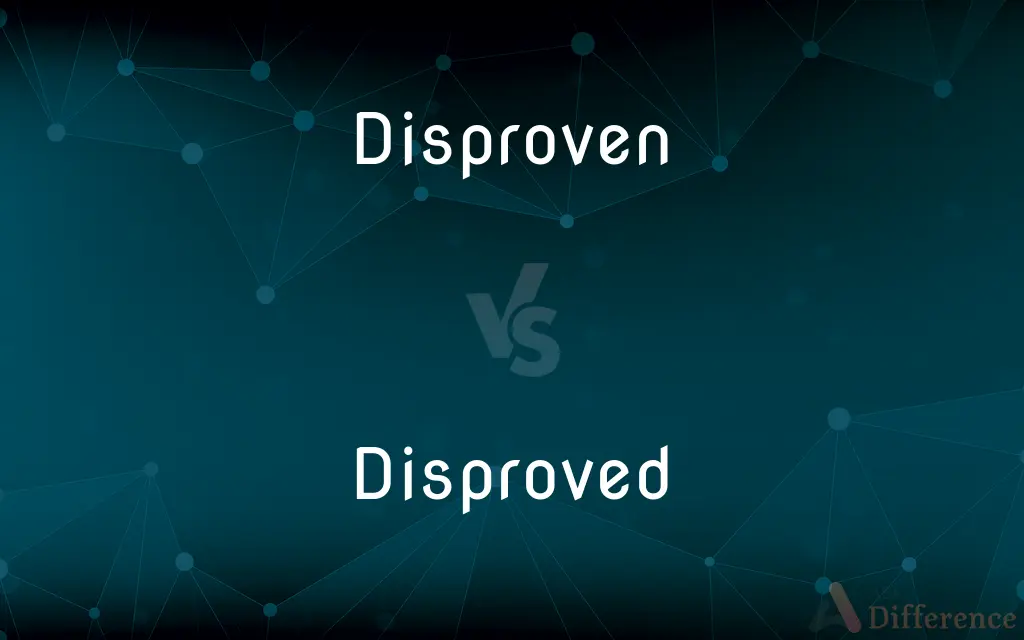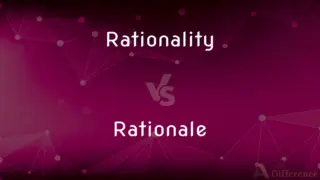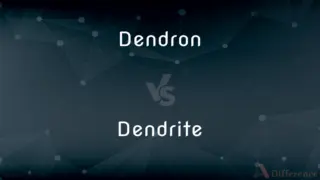Disproven vs. Disproved — What's the Difference?
By Urooj Arif & Fiza Rafique — Updated on April 4, 2024
Disproven highlights the state of being shown false, while disproved focuses on the act of refuting.

Difference Between Disproven and Disproved
Table of Contents
ADVERTISEMENT
Key Differences
Disproven refers to a theory or belief that has been shown to be false based on evidence or logical reasoning. It's a status that indicates something cannot be considered true. Whereas, disproved is the past tense of disprove, describing the action of demonstrating that a theory, statement, or belief is not true through evidence or argument.
While disproven often conveys a general or ongoing sense of falsehood, disproved specifies a particular instance or action where something was shown to be false. For example, a scientific theory might be disproven over years of research, whereas a specific hypothesis could be disproved by a single experiment.
Disproven is used to describe concepts, ideas, or theories that have been shown to lack validity in a broader sense, often over time and through multiple instances of scrutiny. On the other hand, disproved can apply to more immediate and concrete refutations, such as disproving a claim with a counterexample.
The term disproven carries a somewhat more formal or academic connotation, suggesting a consensus or wide acceptance that something is incorrect. Conversely, disproved is more neutral, simply stating that evidence or arguments have been presented against something, without necessarily implying a broad consensus.
In the realm of science and logic, disproven theories are those that have been extensively tested and consistently shown to be false, impacting the collective understanding and guiding future research. Disproved claims, however, might refer to specific instances where predictions or hypotheses did not hold up under experimental scrutiny, which can be a normal part of the scientific process.
ADVERTISEMENT
Comparison Chart
Nature
Adjective (state of being false)
Verb (past tense of disprove)
Usage
Broad, often implies consensus
Specific, refers to an action
Connotation
Formal, academic
Neutral
Temporal Aspect
General/ongoing sense of falsehood
Specific instance/action
Application
Theories, beliefs shown false over time
Immediate refutation of claims with evidence
Compare with Definitions
Disproven
Indicating something has been shown to be false.
The disproven hypothesis was removed from the study.
Disproved
Simply states that something has been refuted.
The old law was disproved by recent studies.
Disproven
Implies comprehensive refutation.
The disproven notion that the Earth is flat still has some adherents.
Disproved
Involves providing counter-evidence.
The amateur detective disproved the suspect's alibi.
Disproven
Used to describe theories widely recognized as incorrect.
Many once-popular theories are now known to be disproven.
Disproved
Pertains to specific evidence or argument.
His argument was quickly disproved by the factual data.
Disproven
Often associated with disproved scientific theories.
The disproven theory of spontaneous generation is taught in history of science classes.
Disproved
Denotes the action of showing something to be false.
The scientist disproved the longstanding theory with her experiment.
Disproven
Reflects a consensus on the falsehood of an idea.
His claims about the drug were quickly classified as disproven.
Disproved
Indicates refutation within research.
They disproved the original hypothesis, leading to new lines of inquiry.
Disproven
Demonstrated by evidence or argument to be false
The attorney's disproven claims are shameful and offensive
Disproved
To prove to be false, invalid, or in error; refute.
Disproven
Alternative irregular form of the disprove
Disproved
Simple past tense and past participle of disprove
Disproven
Shown to be false
Disproven
Not proven, in a legal case where the jury verdict has inconclusive evidence for conviction, but sufficient to suspect guilt
Common Curiosities
What does disproven mean?
Disproven refers to something that has been shown to be false or incorrect, typically after being tested or scrutinized.
Can a theory be both disproven and disproved?
Yes, a theory can be both disproven (shown to be false as a general consensus) and disproved (refuted through specific instances or evidence).
Is disproven only used for theories?
While often used for theories or beliefs, disproven can apply to any claim or assertion shown to be false.
What does disproved mean?
Disproved is the past tense of disprove, meaning to show that something (like a theory or claim) is not true through evidence or argument.
Can disproved be used in legal contexts?
Yes, disproved can be used in legal contexts to indicate that an accusation, claim, or hypothesis has been shown to be false.
Does disproven imply a final verdict?
Disproven often implies a broader or more final consensus on the falsehood of a concept, but it's not absolute and can be subject to change with new evidence.
How do disproven and disproved differ in scientific context?
In science, disproven refers to theories generally accepted as false, whereas disproved refers to the act of refuting specific hypotheses with evidence.
Can personal beliefs be disproven or disproved?
Personal beliefs can be challenged and potentially disproved with evidence, though disproven is more commonly used for widely held theories or concepts.
Does disproven suggest a broader impact than disproved?
Generally, yes, as disproven suggests a wider recognition or acceptance of a theory's or belief's falsehood.
Can new evidence change a disproven theory?
Yes, new evidence can sometimes revive or alter the status of a theory previously considered disproven, highlighting the evolving nature of knowledge.
Is disproved always a result of experimentation?
Not always; disproved can result from logical argumentation, counterexamples, or other forms of evidence, not just experimentation.
Is disproved neutral in tone?
Yes, disproved is neutral, simply indicating that something has been shown to be false, without implying judgment or consensus.
Share Your Discovery

Previous Comparison
Rationality vs. Rationale
Next Comparison
Dendron vs. DendriteAuthor Spotlight
Written by
Urooj ArifUrooj is a skilled content writer at Ask Difference, known for her exceptional ability to simplify complex topics into engaging and informative content. With a passion for research and a flair for clear, concise writing, she consistently delivers articles that resonate with our diverse audience.
Co-written by
Fiza RafiqueFiza Rafique is a skilled content writer at AskDifference.com, where she meticulously refines and enhances written pieces. Drawing from her vast editorial expertise, Fiza ensures clarity, accuracy, and precision in every article. Passionate about language, she continually seeks to elevate the quality of content for readers worldwide.
















































